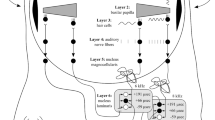Abstract
Jerry Fodor argues that the massive modularity thesis – the claim that (human) cognition is wholly served by domain specific, autonomous computational devices, i.e., modules – is a priori incoherent, self-defeating. The thesis suffers from what Fodor dubs the ‘input problem’: the function of a given module (proprietarily understood) in a wholly modular system presupposes non-modular processes. It will be argued that massive modularity suffers from no such a priori problem. Fodor, however, also offers what he describes as a ‘really real’ input problem (i.e., an empirical one). It will be suggested that this problem is real enough, but it does not selectively strike down massive modularity – it is a problem for everyone.
Similar content being viewed by others
References
S. Baron-Cohen (1995) Mindblindness: An Essay on Autism and Theory of Mind MIT Press Cambridge, MA
P. Boyer (1993) The Naturalness of Religious Ideas: Outline of a Cognitive Theory of Religion University of California Press Berkeley
N. Chomsky (1986) Knowledge of Language: Its Nature, Origin, and Use Praeger Westport
Chomsky (1991) ‘Linguistics and Adjacent Fields: A Personal View’ A Kasher (Eds) The Chomskyan Tum Blackwell Oxford 3–25
N. Chomsky (1996) Powers and Prospects: Reflections on Human Nature and the Social Order Pluto Press London
N. Chomsky (2000a) New Horizons in the Study of Language and Mind Cambridge University Press Cambridge
N. Chomsky (2000b) ‘Minimalist Inquiries: The Framework’ R. Martin D. Michaels J. Uriagereka (Eds) Step by Step:Essays on Minimalist Syntax in Honor of Howard Lasnik MIT Press Cambridge, MA 89–155
N. Chomsky (2003) ‘Reply to Rey’ L.M. Antony N. Hornstein (Eds) Chomsky and His Critics Blackwell Oxford 274–287
M. Colheart (1999) ArticleTitle‘Modularity and Cognition’. Cognitive Science 3 115–120 Occurrence Handle10.1016/S1364-6613(99)01289-9
J. Collins (2000) ArticleTitle‘Theory of Mind, Logical Form, and Eliminativism’. Philosophical Psychology 13 465–490 Occurrence Handle10.1080/09515080020007616
J. Collins (2004) ArticleTitle‘Faculty Disputes’. Mind and Language 19 503–533 Occurrence Handle10.1111/j.0268-1064.2004.00270.x
Collins, J. (forthcoming), ‘Proxytypes and Linguistic Nativism’, Synthese.
S. Dehaene (1997) The number Sense: How the Mind Creates Mathematics Oxford University Press Oxford Occurrence Handle1041.00504
J. Fodor (1975) The Language of Thought Harvard University Press Cambridge, MA
J. Fodor (1983) The Modularity of Mind MIT Press Cambridge, MA
J. Fodor (1987a) Psychosemantics: The Problem of Meaning in the Philosophy of Mind MIT Press Cambridge, MA
J. Fodor (1987b) ‘Modules, Frames, Fridgeons, Sleeping Dogs, and the Music of the Spheres’ J Garfield (Eds) Modularity in Knowledge Representation and Natural-Language Understanding MIT Press Cambridge, MA 25–36
J. Fodor (1990) A Theory of Content and Other Essays MIT Press Cambridge, MA
J. Fodor (1992) ArticleTitle‘A Theory of the Child’s Theory of Mind’. Cognition 44 283–296 Occurrence Handle10.1016/0010-0277(92)90004-2
J. Fodor (1998a) In Critical Condition: Polemical Essays on Cognitive Science and the Philosophy of Mind MIT Press Cambridge, MA
J. Fodor (1998b) Concepts: Where Cognitive Science Went Wrong Oxford University Press Oxford
J. Fodor (2000) The Mind Doesn’t Work That Way: The Scope and Limits of Computational Psychology MIT Press Cambridge, MA
J. Fodor (2001) ArticleTitle‘Doing Without What’s Within: Fiona Cowie’s Critique of Nativism’. Mind 110 99–148 Occurrence Handle10.1093/mind/110.437.99
J. Garfield C. Peterson T. Perry (2001) ArticleTitle‘Social Cognition, Language Acquisition and the Development of the Theory of Mind’. Mind and Language 16 494–541 Occurrence Handle10.1111/1468-0017.00180
G. Gigerenzer (1997) ‘The Modularity of Social Intelligence’ A. Whiten R. Byrne (Eds) Machiavellian Intelligence II:Extensions and Evaluations Cambridge University Press Cambridge 264–288
G. Gigerenzer K. Hug (1992) ArticleTitle‘Domain Specific Reasoning: Social Contracts, Cheating, and Perspective Change’. Cognition 43 127–171 Occurrence Handle10.1016/0010-0277(92)90060-U
J. Higginbotham (1987) ‘The Autonomy of Syntax and Semantics’ J. Garfield (Eds) Modularity in Knowledge Representation and Natural Language Understanding MIT Press Cambridge, MA 119–131
J. Higginbotham (1991) ArticleTitle‘Remarks on the Metaphysics of Linguistics’. Linguistics and Philosophy 14 555–566 Occurrence Handle10.1007/BF00632597
J. Jackendoff (1992) Languages of the Mind: Essays on Mental Representation MIT Press Cambridge, MA
J. Jackendoff (2002) Foundations of Language: Brain Meaning, Grammaer, Evolution Oxford University press Oxford
F. Keil (1989) Concepts,Kinds, and Cognitive Development MIT Press Cambridge, MA
M. Khalidi (2001) ArticleTitle‘Innateness and Domain Specificity’. Philosophical Studies 105 191–210 Occurrence Handle10.1023/A:1010300709123
A. Leslie (1994) ‘ToMM, ToBy, and Agency: Core Architecture and Domain Specificity’ L. Hirschfield S. Gelman (Eds) Mapping the Mind:Domain Specificity in Cognition and Culture Cambridge University Press Cambridge 119–148
J. Mehler E. Dupoux (1994) What Infants Know Blackwell Oxford
S. Nichols (2001) ArticleTitle‘Mindreading and the Cognitive Architecture Underlying Altruistic Motivation’. Mind and Language 16 425–455 Occurrence Handle10.1111/1468-0017.00178
S. Pinker (1997) How the Mind Works Penguin London
H. Plotkin (1997) Evolution in Mind Alan Lane London
J. Prinz (2002) Furnishing the Mind MIT Press Cambridge, MA
R. Samuels (1998) ArticleTitle‘Evolutionary Psychology and the Massive Modularity Hypothesis’. British Journal for the Philosophy of Science 49 575–602 Occurrence Handle10.1093/bjps/49.4.575 Occurrence Handle1674258
B. Scholl A. Leslie (1999) ArticleTitle‘Modularity, Development and ‘Theory of Mind’’. Mind and Language 14 131–153 Occurrence Handle10.1111/1468-0017.00106
G. Segal (1996) ‘The Modularity of Theory of Mind’ P. Carruthers P. Smith (Eds) Theories of Theories of Mind Cambridge University Press Cambridge 141–157
G. Segal (1998) ‘Representing Representations’ P. Carruthers J. Boucher (Eds) Language and Thought:Interdisciplinary Themes Cambridge University Press Cambridge
J. Sloboda (1985) The Musical Mind: The Cognitive Psychology of Music Clarendon Press Oxford
D. Sperber (1994) ‘The Modularity of Thought and the Epidemiology of Representations’ L. Hirschfeld S. Gelman (Eds) Mapping the Mind:Domain Specificity in Cognition and Culture Cambridge University Press Cambridge 39–67
B. Stemmer (1999) ArticleTitle‘An On-line Interview with Noam Chomsky: On the Nature of Pragmatics and Related Issues’. Brain and Language 68 393–401 Occurrence Handle10.1006/brln.1999.2119
J. Tooby L. Cosmides (1992) ‘The Psychological Foundations of Culture’ J. Barkow L. Cosmides J. Tooby (Eds) The Adapted Mind:Evolutionary Psychology and the Generation of Culture Oxford University Press Oxford 19–136
Author information
Authors and Affiliations
Corresponding author
Rights and permissions
About this article
Cite this article
Collins, J. On the Input Problem for Massive Modularity. Mind Mach 15, 1–22 (2005). https://doi.org/10.1007/s11023-004-1346-5
Issue Date:
DOI: https://doi.org/10.1007/s11023-004-1346-5




